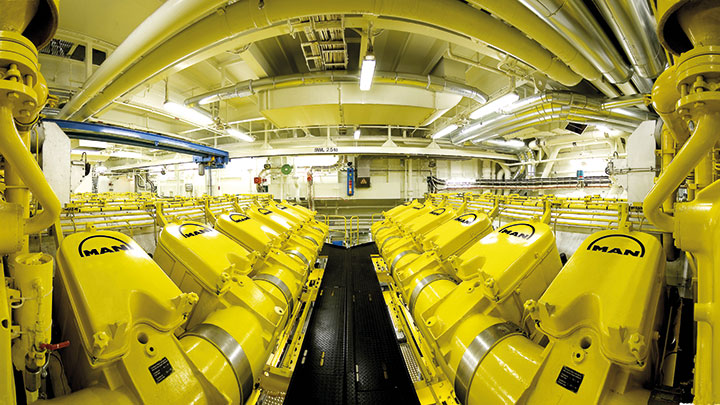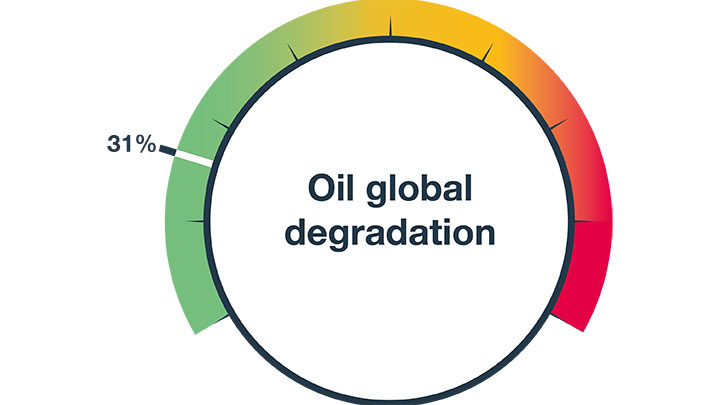Lube oil: the blood of the engine
50% of engine failures result from lube oil contamination or a pollution or degradation. This shows how important the good condition of the lube oil is for the engine lifecycle. Same as blood in the human body, lube oil contains many key indicators. Moreover, the role of this fluid is not only lubrication: its quality and composition determine too the heat dispersion into the engine, its cooling, its cleanness, its protection against corrosion…
Yes, lube oil plays a crucial role for the operation of an engine. When in good condition, it is a factor of reliability and performance ensuring the proper operation of rotating components: bearings, conrods, camshaft, etc. When degraded, it becomes a source of contamination and failures: bearing seizure, cylinder scuffing, wear of pumps, contamination (water ingress, fuel, soot), etc. The list of defects/faults that can cause lube oil degradation is long! In addition, a mere little defect can quickly result in engine failure, so utmost care should be taken. “Even more so when the engine is restarted, because according to stats, 50% of engine damages occur during this phase », warns Joël Kéraval, lube oil technical expert at MAN PrimeServ France.

Monitor the lube oil condition, yes but how?
At MAN PrimeServ, we have answers to this question: MAN Energy Solutions after sales department proposes and combines a whole range of products and services dedicated to lube oil “care”. Training courses, real time monitoring, scheduled follow-up through specialized analyses: industrial engine operators have access to the best of MAN Energy Solutions lube oil care related know how. We also meet the engine operators’ requirements in terms of maintenance and organization and thereby ensure engine “general good health” efficiency and long-term availability.
Training
We organize a dedicated training to make the trainees aware of fluid related requirements, and more especially regarding lube oil and its possible impact – not to say “risk of breakage” – on the relevant components. This training focusses mainly on actual operation and has been worked out for engine operators and maintenance teams. This training lasts one day and is provided by either Augsburg or Saint-Nazaire academies; the course is also available now as e-learning from the PrimeServ Academy website. All these tools are easy to implement in order to meet the customers’ needs, we are very flexible, be it in terms of training content, additional training course or remote training with modern collaborative tools
Analyze
Another service of the lube oil care portfolio: PrimeServLab, whose ambition can be summed up into three key words: (« analyze, monitor, improve») and its mainspring in a sole sentence of an impeccable logic: « Better prevent than repair ». Clearly, the PrimeServLab experts’ main assignment is to analyze lube oil samples (but not only!). And identify the defects before they result in major failures. The principle is indeed simple: the customer collects a lube oil sample into a kit provided by the laboratory and then send it for analysis. Experts from PrimeServLab sift the sample according to strict and proven methodologies and deliver quick results explaining all the relevant issues. This is not the laboratory’s only assignment: if need be, the experts – who analyze more than 8 000 fluid samples per year– attach to their report recommendations for engine operation and inspections. This powerful system covers too, with the same approach and expertise, the cooling water and fuel. The three engine vital fluids undergo thereby thorough examination.
If you have to adjust operating parameters, check your separators or increase the refreshing rate frequency of the lube oil, for example, they will tell you.
Monitor in real time
Finally, the innovation, worked out by PrimeServ to optimize, in real time, the control of the lube oil quality, degradation and contamination, is based on a little panel that could easily go unnoticed if it had not already proven repeatedly that it is extremely useful. Its name? MAN Multi Fluid Monitor for lube oil (MFM). The system provides lube oil condition related information in real time, with follow-up index, and sounds an alarm in case of deviation. New on the market, it is also unique. Its strength lies in its great simplicity to set up and operate (plug & play). « During its operation, an engine “can see” the progress of lube oil degradation and contamination (soot, wear resulting from foreign particles). Hence the idea of creating a continuous lube oil condition monitoring tool, in order to detect directly, and early any deviation. », explains Frédéric Rivière, design engineer of the MFM for lube oil.
How lube oil condition monitoring enables smarter maintenance
Tested for several months on pilots’ customers before it was actually launched on the market, the equipment has met its users ‘satisfaction. We must state that several major failures have been avoided thanks to, for example, the early detection of water leakage (which resulted in preventive replacement of the leaking cylinder head) or a filtration issue with silica contamination (beginning of bearing seizure. « Our customers very quickly grasped the large added value of Multi Fluid Monitor for lube oil and all benefits they could gain », says proudly Frédéric Rivière.
During its operation, an engine “can see” the progress of lube oil degradation and contamination (soot, wear resulting from foreign particles)
What is the added value of combining such services?
All engine operators or maintenance engineers in charge of the engine operation should be able to understand the main characteristics of a high-quality lube oil and the necessary specifications of such lube oil to meet operational requirements and environmental rules and regulations for example. They should be able to perform scheduled sampling operations to check the quality and the composition of the lube oil by relying on laboratory extensive analysis and tests. Those essential analysis are parts of operating and maintenance routines recommended in the operation and maintenance guides of the original manufacturer (OEM). The results and recommendations are used by the operator to include in his maintenance scheduling part inspection/replacement or lube oil change. They can adjust on a regular basis the operational parameters of the engine. If the analysis scheduling is properly carried out, they can act before a damage actually occurs and thereby prevent untimely unavailability of the engine.
By including this system of lube oil continuous monitoring i.e. MFM for lube oil in the operation routines, the operator receives, in real time, some alarms which warns him of any degradation or contamination. The main cases of deterioration or contamination are covered by the system. The earlier a defect is detected, the lesser its impact on the engine operation. In that respect, the operator can replace bearing shells before seizure actually occurs or he can detect early scuffing for example.
His technical skills learnt during fluids related training and his experience in relation to laboratory analysis findings provides him with the necessary background to interpret alarms and process troubleshooting issues. By carrying out as well periodical laboratory analysis, which remain essential, the operator gets a deeper expertise on either an anomaly detected earlier by Multi Fluid Monitor or an even smaller contamination indicative of other type of degradation in progress.

Serious degradation that occurs in a matter of a few minutes, triggers engine stop recommendations or directly stops the engine if the operator decides it should be so. It is essential to prevent engine or crankshaft from a major breakdown - long or even very long engine unavailability which would prove very expensive.
Besides the undoubted interest of these services considered separately, the combination of the 3 items i.e. training / scheduled thorough analyses / real time monitoring enables every owner/operator to enhance capabilities in five key areas:
- Availability
- Efficiency
- Safety
- Sustainability
- Monitoring and controlling
Apply for a personal appointment
MAN Energy Solutions is now Everllence.
We have adopted a new brand name and moved to a new domain: www.everllence.com. This page will also be relocated there shortly. We are working on shifting all pages to www.everllence.com.
